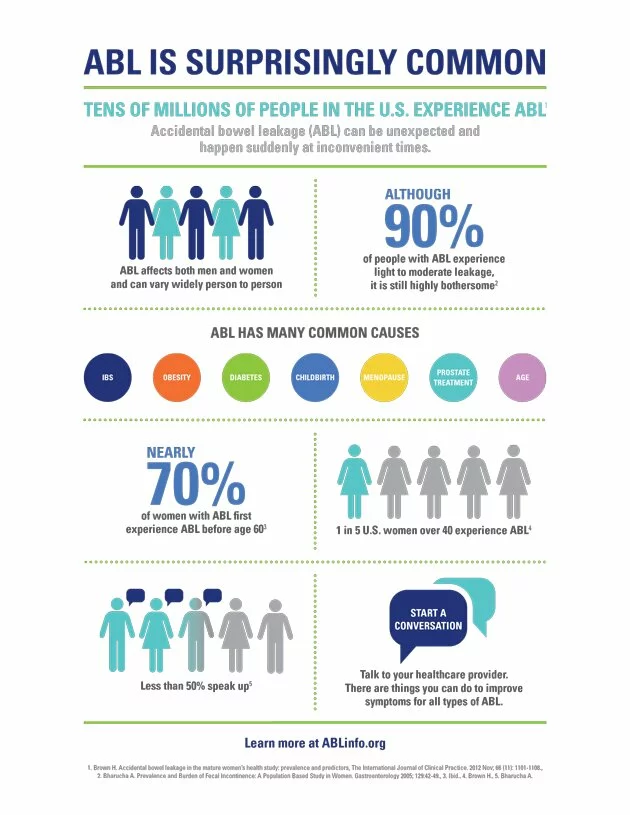You’re not alone, but the silence is loud and clear. That’s the key message from a 2012 research study about accidental bowel leakage (ABL), published by Heidi Brown, MD, et al in the November 2012 International Journal of Clinical Practice. The study found that nearly one in five women over the age of 40 reported an episode of ABL – that’s 15 million American women. Other published studies report that ABL affects men at similar levels as women. “All together, the research published in the last decade indicates tens of millions of women and men experience ABL. The problem is that nobody’s talking about it and too few are seeking care," says Kelly Lewis Brezoczky, Founder, Healthy Mature Living Foundation and ABLinfo.org.
“When tens of millions of women and men over 40 are suffering from this condition, we know it's time to start a conversation so the symptoms can be managed or treated," says Heidi Brown, MD, Contributing Editor, ABLinfo.org and practicing physician at the University of Wisconsin in Madison. Dr. Brown and Ms. Brezoczky collaborated together on the groundbreaking research conducted in the community setting showing high ABL prevalence around women over 40. Dr. Brown clarifies that she expects a similar number of men to also have ABL given the common causes among both women and men. “To manage or treat the symptoms, both women and men need to first know what ABL is and then learn how they can address it. The important thing for people to know is that while ABL varies widely person to person, there are treatments to reduce symptoms for everybody.”

What is ABL?
ABL is the accidental loss of solid or liquid stool and mucus not related to temporary illness such as stomach flu or food poisoning. The most common causes include IBS and chronic diarrhea. Still, there are many additional causes and risk factors. In medical literature, ABL can be referred to as “fecal or bowel incontinence." Research, however, shows people overwhelmingly prefer the term ABL (or accidental bowel leakage). “ABL is a term that makes people more comfortable. ABL is a sensitive topic and making people more comfortable is a way to increase conversation and promote care,” says Brezoczky.
Importantly, 90% of people who suffer from ABL experience light to moderate volume leakage. While ABL is considered bothersome regardless of frequency, there are steps women and men can take to control it and live well. What many people don’t realize is that ABL, for the most part, is highly manageable and there are things you can do to reduce symptoms.
Who does ABL affect?
There are many myths about ABL and who is affected. While ABL can sometimes conjure up images of the elderly, 70% of those affected are younger than 60 years old. “While age is a risk factor, there are many people affected who have other common causes such as IBS,” reports Dr. Brown.
ABL can affect:
- Individuals with irritable bowel syndrome (IBS), chronic diarrhea, diabetes and obesity.
- New moms with injured pelvic floor muscles or nerves from strenuous childbirth.
- Women and men with pelvic floor conditions or illnesses where muscles and nerves have been damaged.
- Women in menopause.
- Men who have had prostate treatment.
It’s Time to Start a Conversation
We hope ABLinfo.org helps you get the facts and start a conversation with your healthcare provider about ABL.
Feel free to email us with any questions you might have. Your anonymous comments are appreciated, as our guest contributors may be interested in featuring your question within their articles or viewpoints.
Download the Infographic here.





 This site complies with the HONcode standard for trustworthy health information: verify here.
This site complies with the HONcode standard for trustworthy health information: verify here.